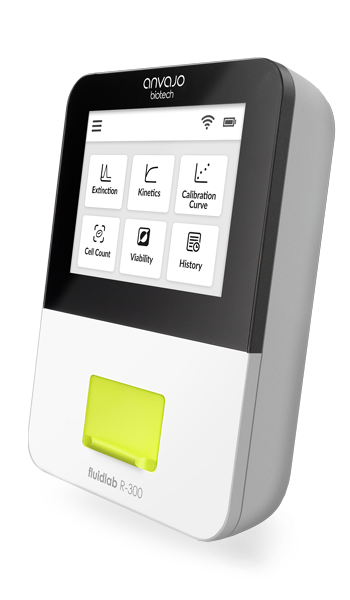Fluidlab R-300

Fluidlab R-300 | Cell Counter & Spectrometer
Distributor & Service Provider In India
Inkarp Instruments, a trusted Anvajo partner, presents the Fluidlab R-300 in India, a revolutionary cell counter and spectrometer.
Combining a full-fledged spectrometer with an automated cell counter, a variety of analyses such as absorbance, scatterlight and time-series measurements, automated cell counting and staining-free viability measurements can be performed. The intuitive handling and precise measurements make the fluidlab R-300 the laboratory instrument of the future.
Cell Counter
- Label-free viability measurements via holographic microscopy
- Large FoV for high statistical significance
- Small sample volume needed (4-20 µl)
Spectrometer
- Full spectral graphs recorded from 375 to 700 nm
- No maintenance and re-calibration needed
- Portable and small
Device
The fluidlab R-300 uses the label-free technique of digital holographic microscopy (DHM) to analyze cell number and viability directly in the cell culture environment. Contrary to brightfield microscopy, DHM does not use optical lenses but generates so-called ‘holograms’ of the cells, which are analyzed by a computer.
- Dimensions
- 128 mm x 94 mm x 33 mm
- Weight
- 240 g
- Display
- 3.5" Color Touch Screen
- Connectivity
- 802.11 b/g/n Wireless LAN
- Battery
- Rechargeable Li-Ion battery
- Battery Runtime
- 5 hours
- Input Voltage
- 5 V DC via USB-C Power Adapter
- Power Adapter
- 100 - 240 V AC 50/60 Hz
- Data Storage
- Internal Flash Memory
Cell Counter
- Imaging Method
- Digital Holography
- Analysis Method
- Machine Learning Classifier
- Field of View
- 2.3 mm x 2.3 mm (5.3 mm²)
- Cell Size Limits
- 3 - 80 µm (cell count), 8 - 80 µm (viability)
Spectrometer
- Light SourceMultiwavelength
- LED Module
- Wavelength Range
- 375 - 700 nm
- Spectral Bandwith
- 2nm
- Photometric Measuring Range
- 0 - 2.5
- Compatible Sample Carriers
- Standard 10 mm cuvettes

